Publications Search Results
Our Publication Search Results
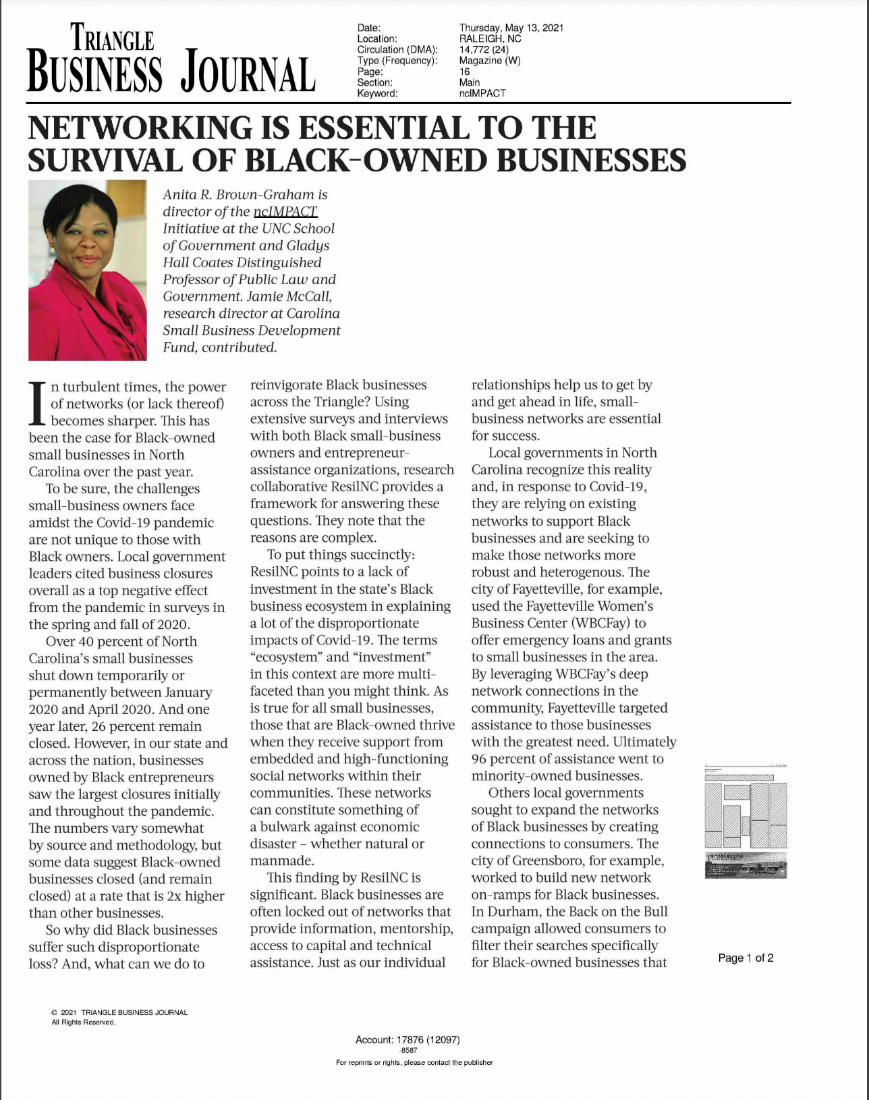
Networking is Essential to the Survival of Black-Owned Businesses
05/13/21“So why did Black businesses suffer such disproportionate loss? And, what can we do to reinvigorate Black businesses across the Triangle? Using extensive surveys and interviews with both Black small-business owners and entrepreneur-assistance organizations, research collaborative ResilNC provides a framework for answering these questions. They note that the reasons are complex.”
…
Continued
Finding a Better Way: A Case Study on Challenges to Inclusive Economic & Workforce Development
12/01/19“Taken together, these results show that working people are challenged to earn enough to make ends meet. One common way to increase compensation is to increase a worker’s level of education and training, and indeed, among the eight overall categories of needs in our survey, 64 percent of respondents chose “Education and Training” as one of the three most important. It was the most-chosen response, with “Employment Support” the next highest at 46 percent (Figure 3).”
…
Continued
The Forsyth Story: A Strategy for Creating a More Inclusive Economy
02/01/19“The ncIMPACT team analyzed demographic data, the results of an electronic survey of Forsyth residents and workers, and comments recorded during interviews and focus groups to distill the county’s present challenges to ten overarching themes”
…
Continued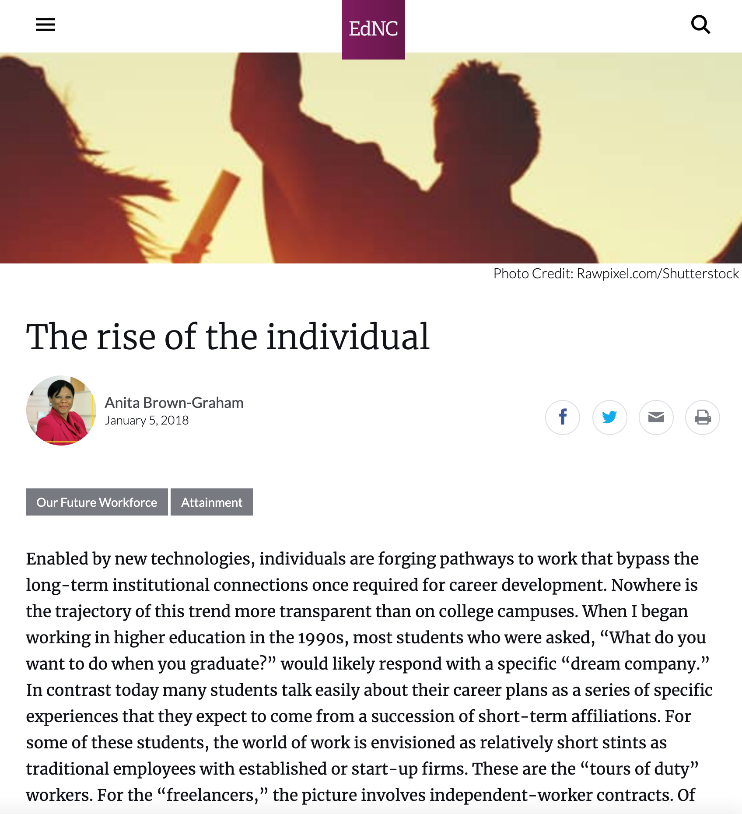
The Rise of the Individual
01/05/18“A new social contract is developing between companies and their workers, driving major changes in the employer-employee relationship. Workers want an enriching experience at every stage, rapid career growth, a compelling and flexible workplace, and a sense of mission and purpose at work. When employers fail to deliver on these employee expectations, and maybe even if they do, they can expect to see their employees leave after a few years.”
…
Continued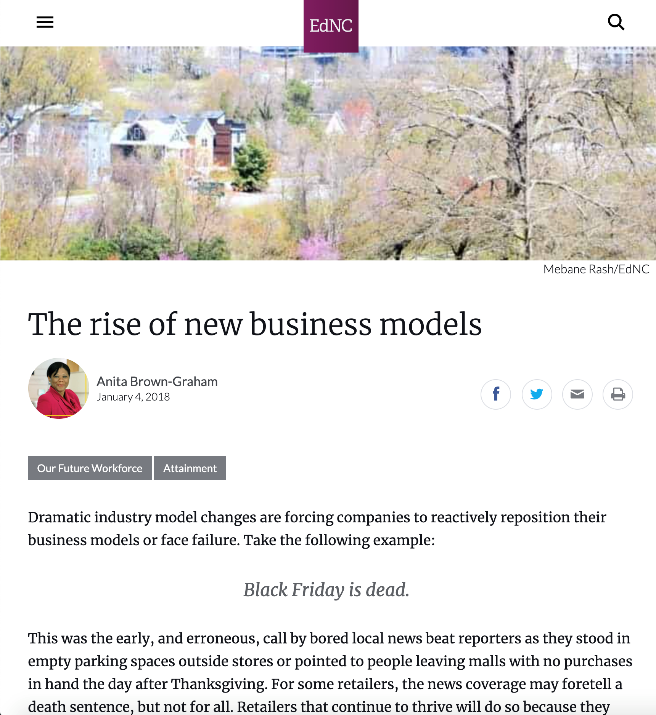
The Rise of New Business Models
01/04/18“Disruption in business is not new. We can all think of companies from our past that ceased to exist some time ago. Remember Kodak? What is different today is the pace of change. Established companies are here today and gone tomorrow. New companies appear today, and dominate the market tomorrow.
As every technology with a computing base advances on an exponential curve, we will continue to see significant disruption in almost every industry over the next decade.”
…
Continued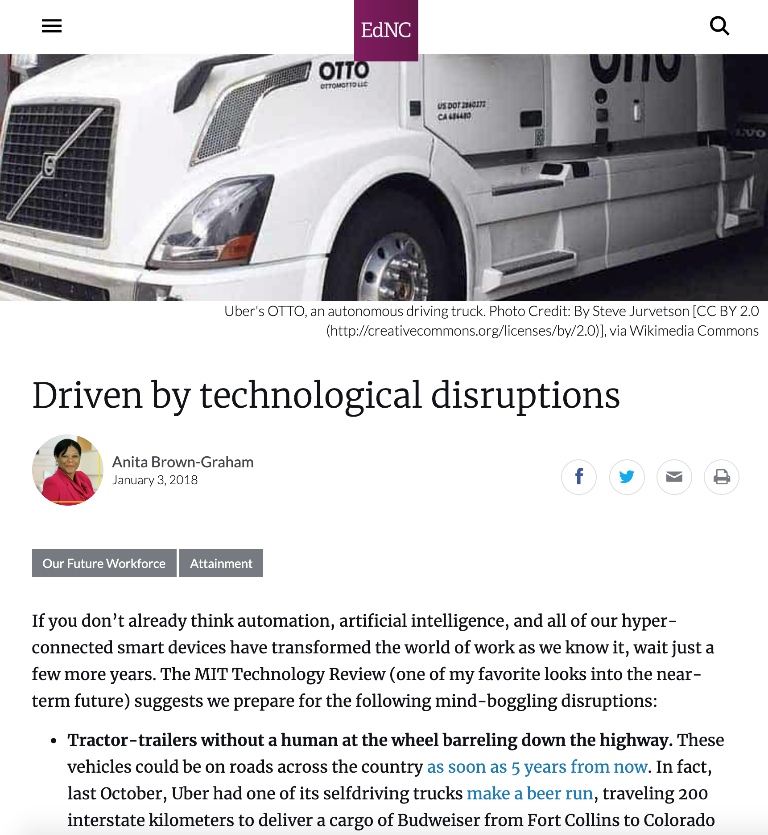
Driven by Technological Disruptions
01/03/18“A report by the World Economic Forum reveals that almost 65 percent of the jobs elementary school students will be doing in the future do not yet exist. Are we able to predict those jobs of the future? Frankly, while we may be able to project how a particular technology might render redundant certain human tasks in order to speculate about technological unemployment, it is more complicated to foresee the multiple ways a future technology may complement or create demand for existing human skills and jobs.”
…
Continued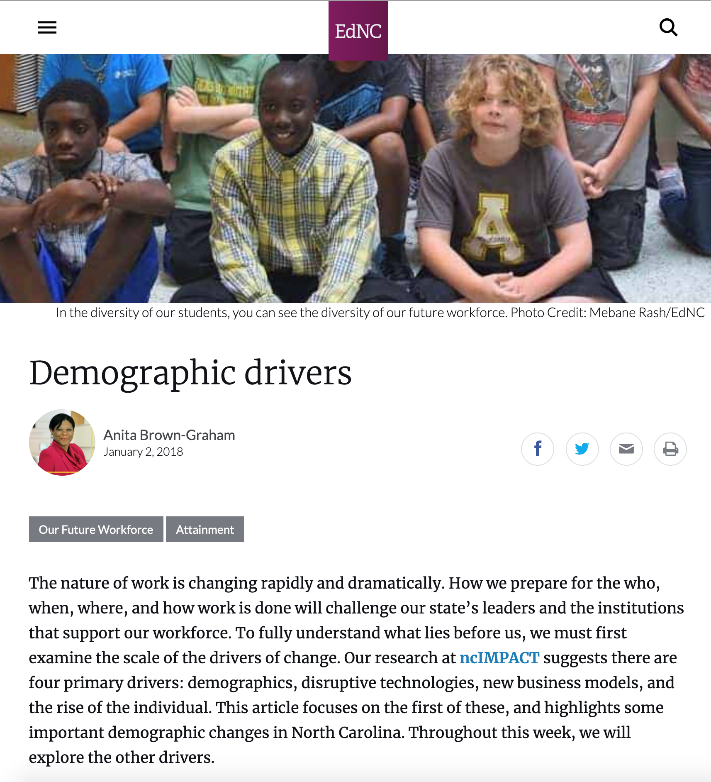
Demographic Drivers
01/02/18“North Carolina is growing. But according to demographic analysis by our friends at Carolina Demography, much of this growth follows a trend of clustering in the state’s existing population centers, and will continue to do so over the next two decades. As people increasingly reside in those areas, strong job growth tends to concentrate there, too.”
…
Continued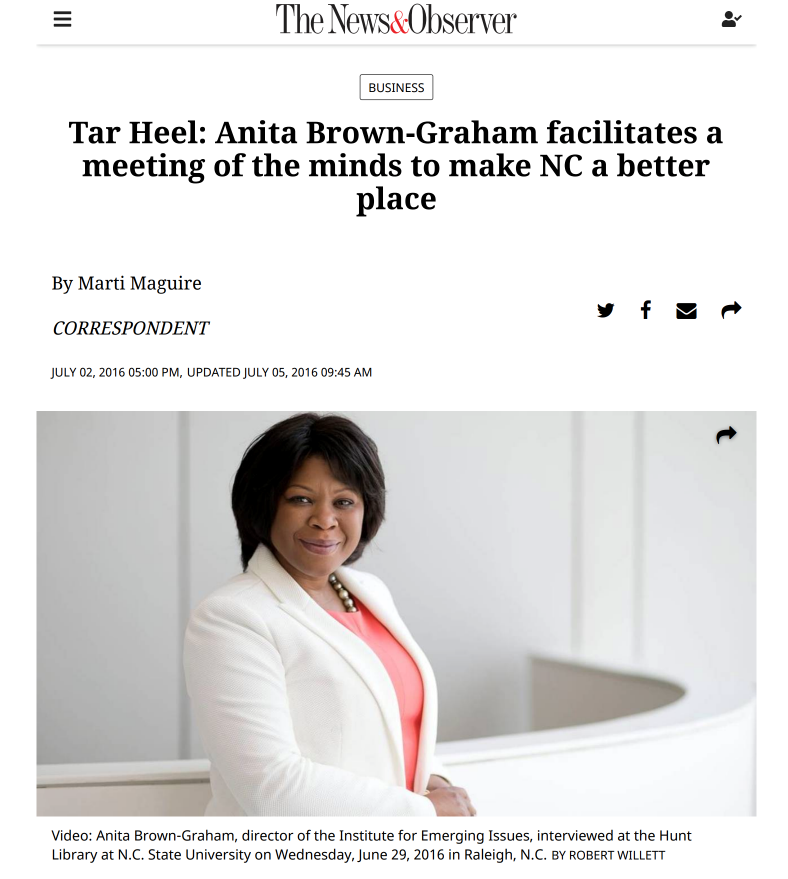
Tar Heel: Anita Brown-Graham Facilitates a Meeting of the Minds to Make NC a Better Place
07/02/16“Brown-Graham has the unique ability to bring diverse communities together to focus on and develop solutions for critical issues facing North Carolina,” says Randy Woodson, chancellor at N.C. State University, where the institute is based. Under her leadership, he says, the institute has “developed into an organization that continually improves the lives of citizens all across North Carolina.”
…
Continued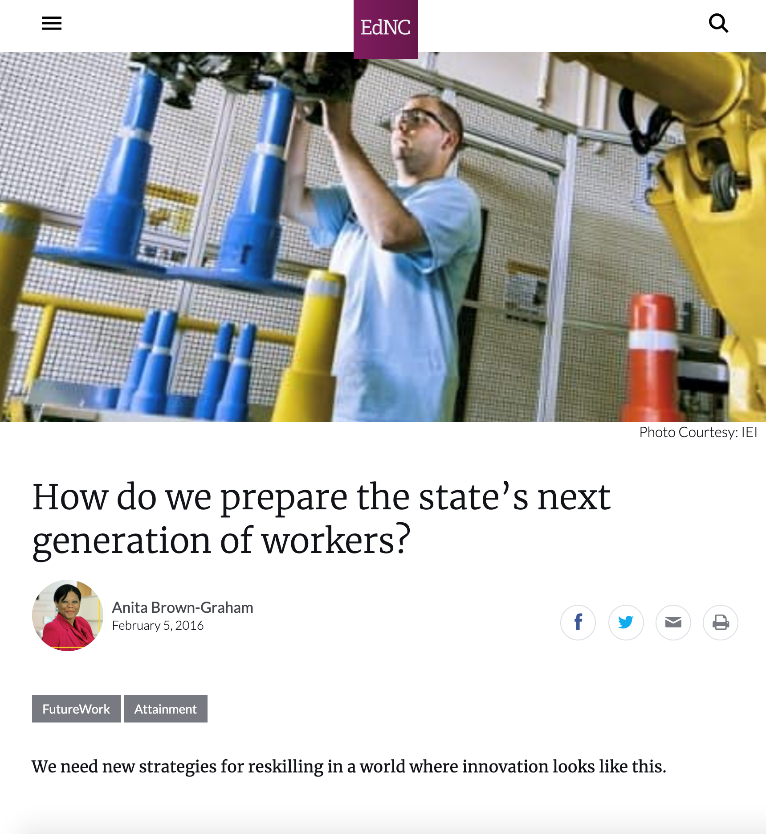
How Do We Prepare the State’s Next Generation of Workers?
02/06/16“Our challenge as a state is to identify opportunities that North Carolina must leverage today to successfully navigate the transformational employment market changes ahead. The Institute for Emerging Issues put that challenge before two groups, a Working Group of workforce and economic development organizations, industry, education systems, policy makers, current and future employees, and other key stakeholders, and Forum Ambassadors, career counseling professionals working in high schools, community colleges, universities, NCWorks Career Centers, local government workforce agencies, and community-based organizations.”
…
Continued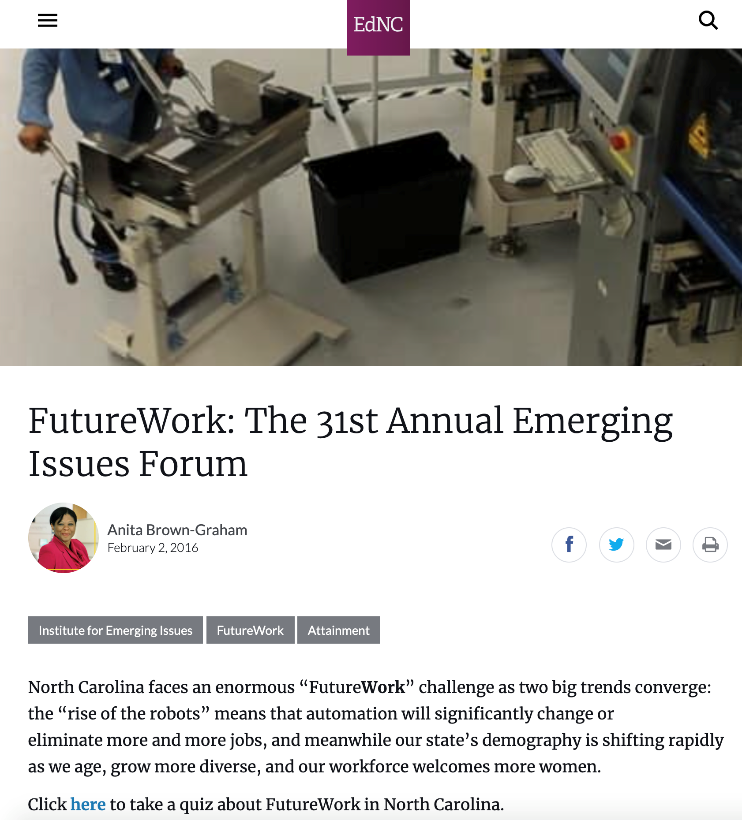
FutureWork: The 31st Annual Emerging Issues Forum
02/02/16“North Carolina faces an enormous “FutureWork” challenge as two big trends converge: the “rise of the robots” means that automation will significantly change or eliminate more and more jobs, and meanwhile our state’s demography is shifting rapidly as we age, grow more diverse, and our workforce welcomes more women.”
…
Continued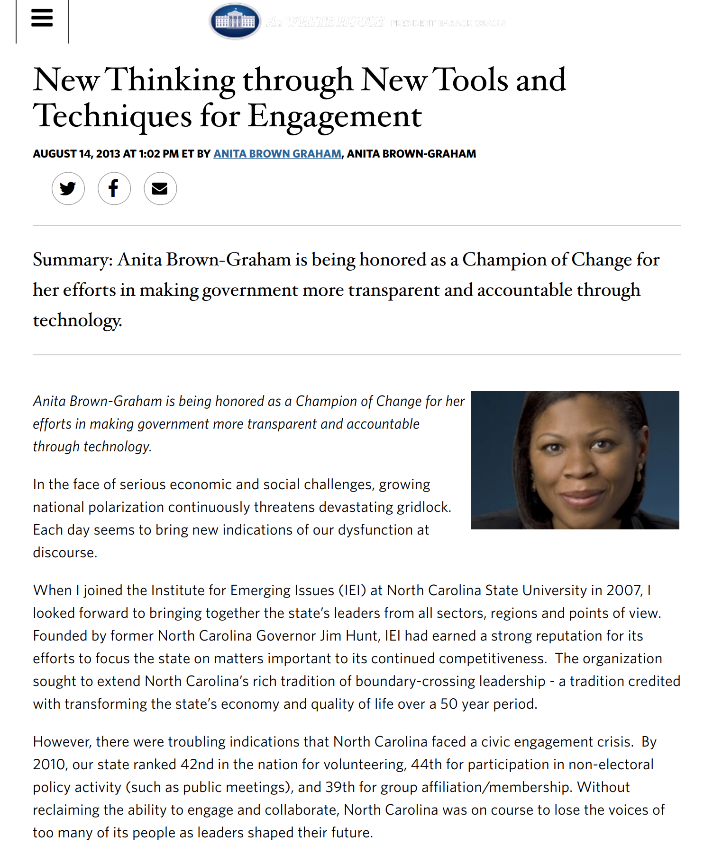
New Thinking through New Tools and Techniques for Engagement
08/14/13“IEI needed to respond to this crisis, but we could not act alone. We reached out for the wisdom of hundreds across the state. With their contributions of content, design support, software innovations and funding, we created the Emerging Issues Commons – a first of its kind engagement tool – both a physical space and an online hub that is today transforming how citizens across the state connect with each other, access information, and take collaborative action on important issues.”
…
Continued
Measures and Methods: Four Tenets for Rural Economic Development in the New Economy
10/01/08“There is no single recipe for prosperity. This is true for all rural areas, whether new economy winners or not. However, for any rural area to compete in the global economy, its development methods must explicitly address each of four pillars: innovation, investments, connections, and preservation.”
…
Continued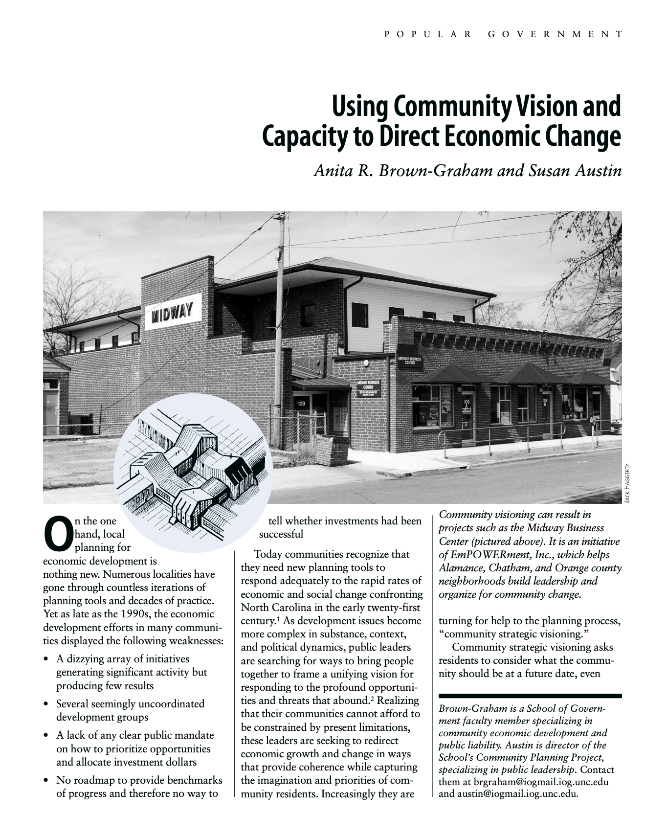
Using Community Vision and Capacity to Direct Economic Change
05/16/04“As development issues become more complex in substance, context, and political dynamics, public leaders are searching for ways to bring people together to frame a unifying vision for responding to the profound opportunities and threats that abound. Realizing that their communities cannot afford to be constrained by present limitations, these leaders are seeking to redirect economic growth and change in ways that provide coherence while capturing the imagination and priorities of community residents.”
…
Continued